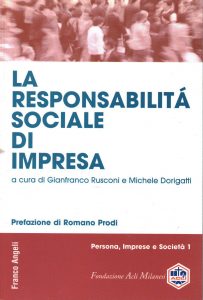Enterprise social responsibility
For a long time now the awareness that the enterprise doesn’t constitute an isolated and shut down reality has been spreading in the business community, in academia and in public opinion; it’s instead an organisation that is placed and acts in a specific context and it’s necessarily asked to engage with the outside.
In the mid-fifties, the Italian pioneer of social responsibility of economic organisations towards the community, whether it was a local or state community, Adriano Olivetti conceived the enterprise, especially the large one, as a “common good” and not so much and not only as a “private interest”.
From this new awareness comes the belief that is functional to the enterprise, and also to the achievement of the main goal, even if not exclusive, of profit and to social legitimacy, that is to take act of interactions and externalities, both positive and negative, that every economic activity creates and causes in the market and in its social community, and to communicate them to all stakeholders.
Therefore, compared to the absolute centrality (not to say, exclusivity) that in the past took the interest of shareholders it was progressively acknowledged the relevance of stakeholders’ interests, particularly of those parties (providers, workers, consumers, local communities) in various ways involved in the company’s own activity, of production and exchange of goods and/or services.
It’s in this perspective that a real ethical breakthrough is invoked and supported, and it should be implemented through the adoption, by economic agents, of ethically oriented and socially responsible conducts that would overcome the narrow logic of the mere maximization of profit and tools of social accountability (among which the social report, mission report, social impact assessment, and so on)
With the concept of Enterprise Social Responsibility (in Italian RSI) - or Corporate Social Responsibility (CSR), the equivalent concept of Anglo-Saxon origin, - it indicates therefore a model of entrepreneurial action, characterised by the attention granted to legitimate ambitions and to additional interests which are also different compared to the only valorisation of venture capital and the increase of shareholder value.
The Charter of Cooperation in Trentino states:
“Social responsibility, a founding value of the cooperative movement enterprises, contributes to their legitimacy but also to the economic development and to the communities’ social well-being".


